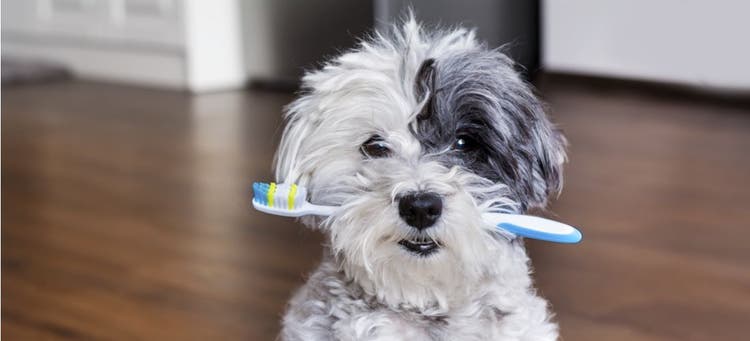
Puppy Dental Care
It’s never too soon to start thinking about your puppy’s oral care. Oral hygiene is an often-overlooked component of a puppy’s overall health. As your dog grows older, dental issues can develop if the proper care isn’t provided. Often, dogs will suffer dental pain without their pet owners knowing, and may go out of their way to hide pain. If your puppy has a toothache or sore gums, they’re dealing with pain and stress that may not be obvious. Untreated dental issues can lead to bacteria being introduced into the bloodstream, which is detrimental to other areas of your pet’s body.
Unfortunately, dental issues are very common in canines. Veterinarians report that about 85 percent of dogs over the age of four are suffering from some form of gum disease. However, almost all of these dental problems can be prevented with regular cleanings and professional checkups.
How Do I Know If My Puppy Suffers from Dental Disease?
You don’t need to go to veterinary school to detect dental issues in your puppy. Many dental issues can be observed using your sensory skills. A common gum condition for both humans and canines is halitosis, which causes bad breath. If you notice your puppy has developed stinky breath, you should go visit your vet and have their mouth examined. Another visual cue that indicates dental issues is yellowish buildup on your puppy’s teeth and gums.
Other signs of canine periodontal disease include:
- Loose teeth
- Gingivitis
- Drooling
- Lack of appetite
- Difficulty chewing
- Bleeding gums
- Pawing at the mouth
If you’re concerned about your pup’s dental health, it’s always in their best interest to schedule an annual oral exam with your vet.
How Do I Keep My Puppy’s Teeth Healthy?
Like exercise and daily walks, proper dental care should be a regular part of your routine as a puppy owner.
During your puppy’s annual oral exam, a veterinarian will examine your dog’s teeth and gums in much the same way that a dentist examines human teeth. The examination will include a visual and manual inspection to check for signs of gum disease, tooth discoloration, loose teeth, and indications of sensitivity or pain. Typically, a veterinarian will clean a dog’s teeth if there is a buildup of tartar or plaque. They may also recommend removing loose teeth and advise either removal or a root canal procedure if there’s tooth decay. Depending on the nature of the procedure, your dog may need to be immobilized using anesthetics.
How Do I Brush My Puppy’s Teeth?
Many pet owners are hesitant to brush their puppy’s teeth themselves. However, tooth brushing is the single most important part of oral care and cannot be overemphasized. If you aren’t comfortable doing it yourself, that’s totally fine. Just make sure you schedule an appointment for an outside party to maintain your puppy’s oral hygiene. If you are comfortable brushing your puppy’s teeth, and your puppy allows it, brushing yourself can also save you money. The more you brush, the better, but try to aim for at least once a week.
Here are guidelines to follow for brushing your puppy’s teeth:
- Brushing should be done with a utensil designed to remove plaque from under the gum line.
- Pick a time of day that will become a convenient part of your puppy’s daily routine. Brushing before offering a treat can actually help your canine look forward to brushing time.
- Use a soft-bristled toothbrush and veterinary toothpaste. Don’t use toothpaste that is designed for humans.
- Start by offering your puppy a taste of the veterinary toothpaste. Then, next time, have them retaste the toothpaste, running your finger along the gums of their upper teeth. Repeat the process with a toothbrush until your canine develops a comfort level.
How Pet Insurance Can Keep Your Puppy’s Mouth Healthy
It is imperative that a puppy owner pays attention to the oral health of their pet. By making dental care a regular part of your puppy’s routine, you are setting your dog up for a healthy life. Another way to keep your companion healthy is by getting them pet insurance. Having a puppy can get expensive, especially when unexpected illnesses or accidents occur. Annual vaccinations, dental exams, and spaying and neutering can all make the costs of pet ownership add up in a hurry.
Visit PetPartners and get a quote today to see if pet insurance is right for you.